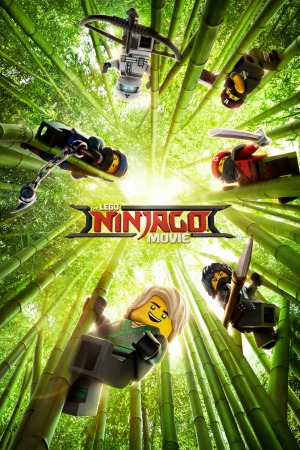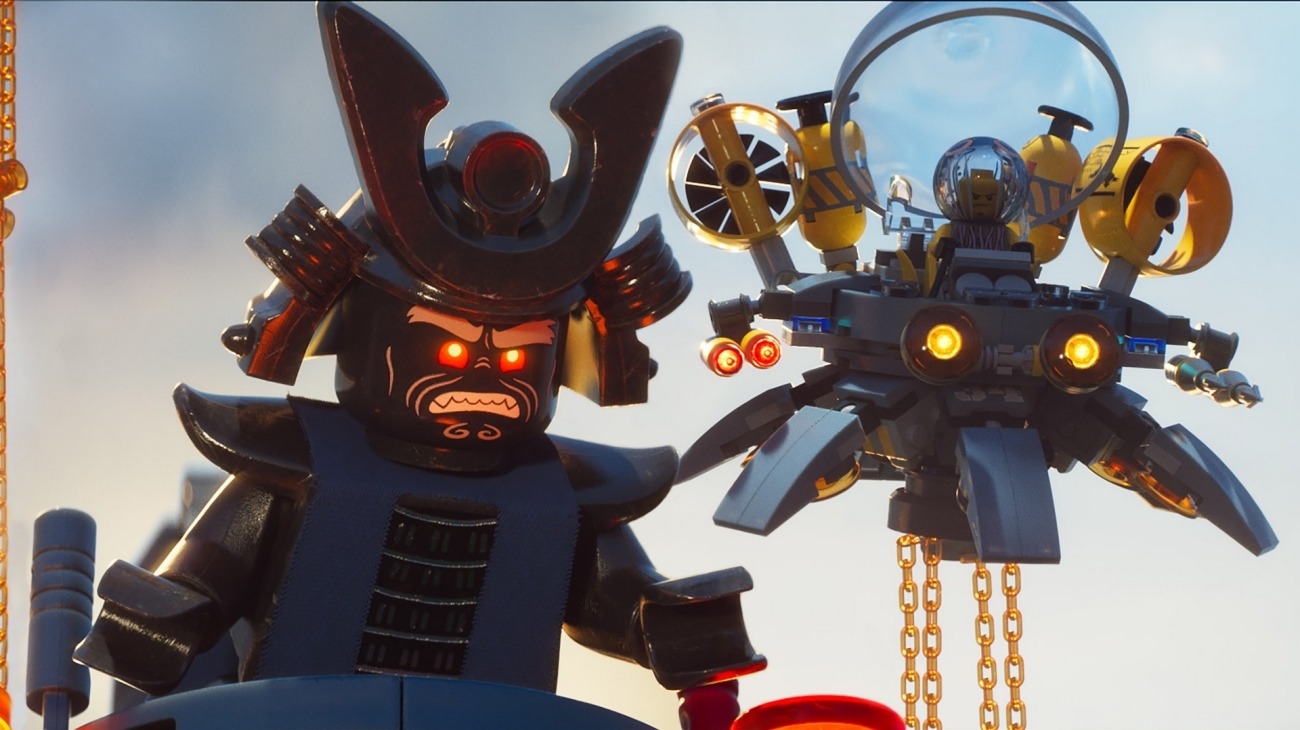
Against the ninja
In what surely counts among the least-surprising developments of the 2017 movie year, it turns out that you can't keep making the same feature-length commercial over and over again with the same plot and the same jokes, and expect that it's going to keep working out. 2014's The Lego Movie remains a modern miracle for a lot of reasons, but it never established a workable model for spin-offs and sequels; its success has everything to do with the mixture of cynicism and earnestness that directors Phil Lord and Chris Miller have brought to every one of their completed projects to date, and that seemingly no other living comedy filmmakers are able to replicate. That was an obvious lesson of The Lego Batman Movie from last February, and it's reiterated in The Lego Ninjago Movie, a film that lacks any merits that aren't second-hand (or even third-hand!), and finally places the franchise securely in territory it's managed to avoid twice, against all odds: this movie pretty obviously just wants to sell toys to kids.
Again, none of this was surprising, not from the moment that Warner Animation Group and the Danish block manufacturer announced, in defiance of absolutely every bit of common sense, that they were going to crank out two of these movies in one calendar year (which, even strictly viewed as a business decision, was obviously the wrong call). But it can still be disappointing, even depressing, to see the results play out. The film takes place in a burgeoning metropolis named Ninjago, where life goes on much as in any world city: people laugh, people love, people cower in fear from the non-stop attacks of a mad techno-warlord named Garmadon (Justin Theroux), who wants nothing more than to take over Ninjago with his shark-themed superweapons. He is turned back time and time again by a team of six ninjas riding giant mechas, beloved heroes of all despite nobody knowing who they are. Ironic, then, that one of them is among the most despised 16-year-olds at the local high school: Lloyd (Dave Franco), Garmadon's son, who has spent his whole life being ostracised for a father who hasn't spoken to him or can be bothered to remember he exists.
That plot hook is already riding the line between stupid and clever pretty damn hard; the blend of abandoned teen angst, 1970s chopsocky plotting (it involves the six ninjas finding a magical whatsit and learning how to truly harness their power), and 1990s anime action sequences needed a lot more precise, careful management than it has been granted in order to avoid turning into syrupy clichés about daddy issues and family. Indeed, it was this kind of mismanagement that in part broke The Lego Batman Movie, whose second, vastly less appealing half fucked up in mostly the same ways that Ninjago fucks up across its entire running time: tacky sentiment crushed up against pervasive pop culture riffs that seem weirdly misaimed, given the target audience.
This obsession with pop culture gags has been a constant throughout all of the Lego features, but never so glumly uninspired as it is here: The Lego Movie had its boundless sandbox conceit to mix and match references and tropes across genres and generations, and Lego Batman at least had one of 20th Century pop culture's most well-known characters, and the accumulated baggage of eight decades, to shuffle around in a giddy, snarky remix. Ninjago has Good Morning America hosts Michael Strahan and Robin Roberts as themselves, a blunt, unimaginative non-joke that doesn't even rise up to the level of the flimsy celebrity cameos in the Cars movies, which at least involve dopey car-themed puns. And as these movies will, it also includes terrible song cues, most notably involving a painfully forced Jim Croce gag that involves playing the entirety of "I Got a Name" as a punchline. I wouldn't go so far as to say that the film is without humor; plenty of jokes land, very nearly all of them delivered by Theroux in a largely successful attempt at mimicking Will Arnett's egomaniacal Batman, or Kumail Nanjiani as the most easily panicked member of the ninja team (the film has gone to great lengths to arrange for a gifted comic team to voice those characters - Fred Armisen, Michael Peña, Abbi Jacobson, and Zach Woods join Nanjiani - and then gives none of them anything interesting to do). But none of them have the spark of the unexpected; it's all comfort food humor, the sort that's funny because it was funny twice before.
For the most part, Ninjago is only really interesting in the most marginal ways. The live-action framework narrative, for example, which centers on a young boy (Kaan Guldur) wandering into a shop of mystical wonders owned by Mr. Liu (Jackie Chan, who also voices the wise old mystic who guides the six mecha-ninjas) to avoid bullies, and there learning a story that... has absolutely nothing to do with any of that, in fact. Frankly, I don't get what the resonances are supposed to be, or why there's a framework at all. But it is nice to see Chan being so comfortably goofy onscreen, and his grandfatherly rapport with Guldur is the most satisfying, emotionally real thing that happens anywhere in the movie.
And there also the little details of the animation, and I'll say this at least for Ninjago: it's beautiful to look at. Like the previous Lego movies, Ninjago was the work of Animal Logic, the Australian visual effects house, and once again the illusion actual plastic toys given inner life is virtually seamless. The universe this film takes place in subtly different: the water is actual water (by which I mean, of course, "virtual water"), and the characters aren't beholden to the actual articulation of Lego minifigures, which is a double-edged sword; they're more expressive than in the other films, but at the cost of some of the low-fi charm of jerky movement that makes them seem playful and unique. The movement is fast but easy to follow and appreciate, the textures are delightful, the body language is elaborately fun and expressive. And actually, as I think of it, all that is also third-hand. But pleasurable anyway, and if the film is lazy as hell at both storytelling and joke construction, at least it puts in the work to look beautiful, even if it advances the franchise style not one iota.
Again, none of this was surprising, not from the moment that Warner Animation Group and the Danish block manufacturer announced, in defiance of absolutely every bit of common sense, that they were going to crank out two of these movies in one calendar year (which, even strictly viewed as a business decision, was obviously the wrong call). But it can still be disappointing, even depressing, to see the results play out. The film takes place in a burgeoning metropolis named Ninjago, where life goes on much as in any world city: people laugh, people love, people cower in fear from the non-stop attacks of a mad techno-warlord named Garmadon (Justin Theroux), who wants nothing more than to take over Ninjago with his shark-themed superweapons. He is turned back time and time again by a team of six ninjas riding giant mechas, beloved heroes of all despite nobody knowing who they are. Ironic, then, that one of them is among the most despised 16-year-olds at the local high school: Lloyd (Dave Franco), Garmadon's son, who has spent his whole life being ostracised for a father who hasn't spoken to him or can be bothered to remember he exists.
That plot hook is already riding the line between stupid and clever pretty damn hard; the blend of abandoned teen angst, 1970s chopsocky plotting (it involves the six ninjas finding a magical whatsit and learning how to truly harness their power), and 1990s anime action sequences needed a lot more precise, careful management than it has been granted in order to avoid turning into syrupy clichés about daddy issues and family. Indeed, it was this kind of mismanagement that in part broke The Lego Batman Movie, whose second, vastly less appealing half fucked up in mostly the same ways that Ninjago fucks up across its entire running time: tacky sentiment crushed up against pervasive pop culture riffs that seem weirdly misaimed, given the target audience.
This obsession with pop culture gags has been a constant throughout all of the Lego features, but never so glumly uninspired as it is here: The Lego Movie had its boundless sandbox conceit to mix and match references and tropes across genres and generations, and Lego Batman at least had one of 20th Century pop culture's most well-known characters, and the accumulated baggage of eight decades, to shuffle around in a giddy, snarky remix. Ninjago has Good Morning America hosts Michael Strahan and Robin Roberts as themselves, a blunt, unimaginative non-joke that doesn't even rise up to the level of the flimsy celebrity cameos in the Cars movies, which at least involve dopey car-themed puns. And as these movies will, it also includes terrible song cues, most notably involving a painfully forced Jim Croce gag that involves playing the entirety of "I Got a Name" as a punchline. I wouldn't go so far as to say that the film is without humor; plenty of jokes land, very nearly all of them delivered by Theroux in a largely successful attempt at mimicking Will Arnett's egomaniacal Batman, or Kumail Nanjiani as the most easily panicked member of the ninja team (the film has gone to great lengths to arrange for a gifted comic team to voice those characters - Fred Armisen, Michael Peña, Abbi Jacobson, and Zach Woods join Nanjiani - and then gives none of them anything interesting to do). But none of them have the spark of the unexpected; it's all comfort food humor, the sort that's funny because it was funny twice before.
For the most part, Ninjago is only really interesting in the most marginal ways. The live-action framework narrative, for example, which centers on a young boy (Kaan Guldur) wandering into a shop of mystical wonders owned by Mr. Liu (Jackie Chan, who also voices the wise old mystic who guides the six mecha-ninjas) to avoid bullies, and there learning a story that... has absolutely nothing to do with any of that, in fact. Frankly, I don't get what the resonances are supposed to be, or why there's a framework at all. But it is nice to see Chan being so comfortably goofy onscreen, and his grandfatherly rapport with Guldur is the most satisfying, emotionally real thing that happens anywhere in the movie.
And there also the little details of the animation, and I'll say this at least for Ninjago: it's beautiful to look at. Like the previous Lego movies, Ninjago was the work of Animal Logic, the Australian visual effects house, and once again the illusion actual plastic toys given inner life is virtually seamless. The universe this film takes place in subtly different: the water is actual water (by which I mean, of course, "virtual water"), and the characters aren't beholden to the actual articulation of Lego minifigures, which is a double-edged sword; they're more expressive than in the other films, but at the cost of some of the low-fi charm of jerky movement that makes them seem playful and unique. The movement is fast but easy to follow and appreciate, the textures are delightful, the body language is elaborately fun and expressive. And actually, as I think of it, all that is also third-hand. But pleasurable anyway, and if the film is lazy as hell at both storytelling and joke construction, at least it puts in the work to look beautiful, even if it advances the franchise style not one iota.






